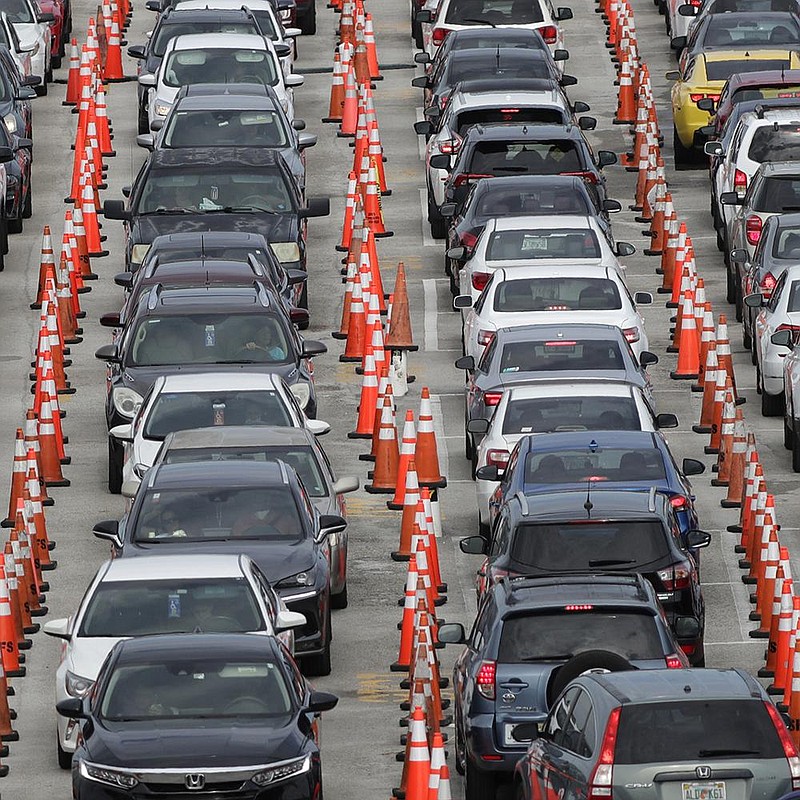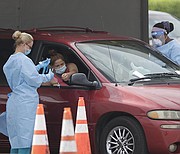The Independence Day weekend concluded with dire predictions about the surge of coronavirus cases across the country and with national and local officials saying a rush to reopen fueled the spread of the virus and outpaced efforts to care for its victims.
"We're right back where we were at the peak of the epidemic during the New York outbreak," former Food and Drug Administration Commissioner Scott Gottlieb said on "Face the Nation" on CBS. "The difference now is that we really had one epicenter of spread when New York was going through its hardship; now we really have four major epicenters of spread: Los Angeles, cities in Texas, cities in Florida, and Arizona. And Florida looks to be in the worst shape."
New coronavirus cases in that state Sunday exceeded 10,000 for the third time in the past week, after the state posted a record of 11,458 the previous day. The new infections pushed Florida's total caseload past 200,000, a mark passed by only two other states, New York and California.
[Video not showing up above? Click here to watch » https://www.youtube.com/watch?v=nRN_zZa0K_Y]
"It's clear that the growth is exponential at this point," Miami Mayor Francis Suarez, a Republican, said on ABC's "This Week." More than 47,000 of Florida's cases are in Miami-Dade County.
"We've been breaking record after record after record ... the last couple of weeks," Suarez said. If the numbers don't begin to fall, the mayor said, he would impose "more drastic measures" in the coming week.
The rolling seven-day average for daily new cases in the United States reached a high for the 27th day in a row, climbing past 48,000 on Sunday, according to The Washington Post's tracking. Coronavirus-related hospitalizations rose to their highest levels to date in Arizona and Nevada.
FDA Commissioner Stephen Hahn was pressed to analyze President Donald Trump's comments Saturday that a vaccine would be ready "long before the end of the year," and that 99% of the cases have been "totally harmless."
Hahn dodged both in appearances on Sunday talk shows.
"If you don't follow local and state guidelines about what to do, if you're not following the CDC [Centers for Disease Control and Prevention] and White House task force guidelines, you are putting yourselves and you're putting your loved ones at risk," Hahn said on CNN.
He also said it was "too early to tell" whether the Republican National Convention could be held safely in Jacksonville, Fla., next month. "We'll have to see how this unfolds in Florida and elsewhere around the country," he said.
Trump's campaign Sunday said the president would hold an outdoor rally Saturday night at Portsmouth International Airport in New Hampshire. "There will be ample access to hand sanitizer and all attendees will be provided a face mask that they are strongly encouraged to wear," the campaign said in announcing the event.
Hahn, on ABC, refused to be pinned down about whether there would be a vaccine by the end of the year, as the president has said there will be.
[CORONAVIRUS: Click here for our complete coverage » arkansasonline.com/coronavirus]
"I can't predict when a vaccine will be available," he said, adding that the FDA was moving with "unprecedented speed for the development of a vaccine."
But he noted that his department issued guidelines last week about vaccine development because "our solemn promise to the American people is that we will make a decision based upon the data and science on a vaccine with respect to the safety and effectiveness of that vaccine."
Public health experts continued to push back on what they say are misleading claims that the surge in cases is the result of expanded testing capacity alone. "When the virus is under control, testing doesn't uncover more cases," Gottlieb said. "It's a tool for keeping the epidemic at bay."
Frustration about the pandemic response has mounted among local leaders, who say they have had to grapple with conflicting orders and frequently changing guidelines from governors and the White House as they try to curb sharply rising infections.
A MAYOR WORRIES
After Texas reported another single-day record for new cases over the weekend, Austin Mayor Steve Adler told CNN's "State of the Union" that there won't be enough medical personnel to keep up with the spike in cases if the rate of increase continues unabated in his city.
"If we don't change this trajectory, then I am within two weeks of having our hospitals overrun," said Adler, a Democrat, adding that intensive care units in the city could be overflowing within 10 days. He said he was not sure that Texas needed a statewide shelter-in-place order, but he wanted the authority to impose one locally.
Adler said the lack of unified public health messaging is endangering Texans, and expressed anger over the president's statements that the virus could "just disappear."
"And when they start hearing that kind of ambiguous message coming out of Washington, there are more and more people that won't wear masks, that won't social distance, that won't do what it takes to keep a community safe," the mayor said. "And that's wrong, and it's dangerous."
Houston has rapidly become one of the American cities hit hardest. In addition to strained hospital capacity, it needs help meeting the demand for testing, Mayor Sylvester Turner told "Face the Nation" on Sunday.
Over the past month, the proportion of tests that come back positive has rocketed from about one in 10 to nearly one in four, said Turner, a Democrat.
Judge Lina Hidalgo, the top elected official in Harris County, which encompasses the Houston metro area, echoed those concerns in an interview with ABC News' "This Week," saying hospitals were nearing capacity.
"We don't have room for incrementalism," Hidalgo said.
The Democrat said she had been stripped of authority to issue stay-home orders after Gov. Greg Abbott, a Republican, decided to move forward with an aggressive reopening plan in the spring. All she could do now was issue "recommendations," which were nowhere near as effective, she said.
[Gallery not loading above? Click here for more photos » arkansasonline.com/75covid/]
"As long as we're doing as little as possible and hoping for the best, we're always going to be chasing this thing, we're always going to be behind, and the virus will always outrun us," Hidalgo said. "And so what we need right now is to do what works, which is a stay-home order."
The Fourth of July weekend also saw some defiance of Abbott's orders closing bars again and requiring people to wear face coverings in public in much of the state.
People flocked to cookouts and lakes to celebrate Saturday, with some not wearing masks or appearing to keep a safe distance from others. In Fort Worth, a bar may have its license suspended after hosting a "Tea Party Protest" on Saturday, WFAA-TV reported.
FLORIDA SOARS
Local officials said mixed messages about reopening contributed to a false sense among the public that the crisis had passed.
"The city of Miami was the last city in the entire state of Florida to open. I was criticized for waiting so long," said Suarez, Miami's mayor. "But there's no doubt that the fact that when we reopened, people started socializing as if ... the virus didn't exist."
It took three months, from early March to June 22, for Florida to cross 100,000 new confirmed covid-19 cases. It took less than two weeks for the state to go from 100,000 to 200,000 cases -- and the positive test rate keeps rising.
The 10,059 confirmed new cases from Sunday's Florida Department of Health update, the third-highest single-day total, shot the state's pandemic case number to 200,111.
While there's been an increase in testing, there's also been a leap in the positive test rate. The average daily positive test rate from July 21 through Jun 27 was 9.94%. The average for the next seven days was 14.47%.
Another 29 deaths were reported around the state Sunday, bringing that total to 3,832.
As Broward County reset its single-day high for the second day in a row, South Florida accounted for 46.3% of the new cases, but slightly less than a third of the new deaths.
In Arizona, Phoenix Mayor Kate Gallego, a Democrat, attributed soaring case numbers to the state's decision to resume business as usual before the virus was under control. She noted that young people who ignored health precautions had probably led the explosion.
Gallego said federal officials had dismissed her requests to conduct community-based testing after people reported waiting in line for six hours at some testing sites. "We were told they're moving away from that," she said, "which feels like they are declaring victory while we're still in crisis mode."
'IN A DIFFERENT PLACE'
The number of U.S. deaths and the morbidity rate have not increased with the surge in new cases, in part because the spike in infections has been among younger, more resilient victims. And health officials say they know more about the disease than they did when deaths were on the rise.
"What we're able to do is when people do get hospitalized and get into the ICU, we're able to save more lives with treatments like remdesivir, with steroids now, which has a big impact on mortality, and innovations in care like using blood thinners on patients and not intubating them as aggressively," Gottlieb said.
Said Hahn: "We are in a fundamentally different place now than we were in March and April."
But Gottlieb said the U.S. should be building up reserves of therapeutic antibodies now ahead of any potential approval or emergency-use authorization to treat the coronavirus.
"We need a more coordinated national strategy around this," Gottlieb said, adding that the federal government could encourage drugmakers to curtail production of less essential medicines for a time in favor of making more antibody treatments now.
A handful of drugmakers and academic centers are racing to test new antibody treatments from the blood of recovered covid-19 patients.
The government should be working with companies ahead of time to make sure enough supplies are available, the former FDA head said. "That's what should be happening, particularly around the antibodies. We missed the window to do it on remdesivir," he said, referring to the drug that received emergency-use authorization from the agency in May.
The country may have enough of the drug for now, but if the pandemic worsens and doctors seek to use remdesivir beyond the scope of its current label -- particularly in patients with pre-existing conditions before they become very sick -- the U.S. won't have enough medicine for that, Gottlieb said.
He had cautious words about the fall and winter and the likely incidence of the coronavirus.
"We're not going to be able to crush this virus at this point because there's so much infection around, and we really don't seem to have the political will to do it," Gottlieb said.
Information for this article was contributed by Robert Barnes, Derek Hawkins, Elise Viebeck and Marissa Iati of The Washington Post; by Jake Bleiberg of The Associated Press; by Cristin Flanagan of Bloomberg News; and by David J. Neal of Tribune News Service.


